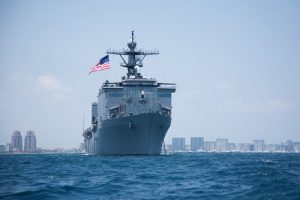
U.S. Sen. Roger Wicker (R-MS) on Feb. 26 introduced the Surface Warfare Enhancement Act of 2018, S. 2452, legislation to improve the ability of the United States Navy to conduct combat operations and activities in the aftermath of two deadly ship collisions last summer.
“Overextended and undermanned ships, overworked crews, fewer officers with naval mastery, and confusing chains of command have contributed to a decline in our naval power,” said Sen. Wicker, who serves on the Senate Armed Services Committee and chairs the panel’s Seapower Subcommittee. “My legislation — based on the Navy’s own recommendations — is specifically designed to address these and other challenges.”
And while he has confidence in the Navy’s leadership, Wicker said he nonetheless thinks Congress must get involved and help the military branch move forward.
Senate Armed Services Committee Chairman John McCain (R-AZ), a cosponsor of S. 2452, agreed. “The status quo is unacceptable. Congress must provide the funding and oversight required to keep our military safe in peace and effective in combat.”
If enacted, S. 2452 would require the Navy to review its organizational structure and chains of command, according to a summary provided by the senator’s office. The bill also would call for a senior Navy civilian employee confirmed by the U.S. Senate to be put in charge of vessel maintenance.
Among additional provisions under S. 2452, enlisted sailors would need to meet minimum qualification requirements in at-sea and simulator-based trainings to gain vital ship positions, according to the summary, and the Navy would have to maintain records on the watch standing and training completed by surface warfare officers.
In October 2017, the U.S. Navy released its report on completed investigations into the deadly ship collisions that in separate but similar incidents killed a total of 17 sailors and damaged two of its warships, the USS Fitzgerald and the USS John S. McCain. The Navy concluded that both events — in which the 300-crew destroyers each collided with ships weighing over three times their size in gross tonnage — were avoidable and that watch standers largely were to blame.
“In the wake of the tragic accidents involving the USS Fitzgerald and USS McCain, our commanders and sailors have been calling for meaningful reform,” Sen. Wicker said.
Sen. McCain pointed out that such “significant shortcomings in our Navy’s readiness can have disastrous results.” He noted that numerous naval ship collisions during 2017 have “degraded the capabilities of our fleet, cost hundreds of millions of taxpayer dollars, and — most importantly — took precious lives.”
S. 2452 has been referred to the Senate Armed Services Committee for consideration, where McCain said he looks forward to working with Wicker on the bill as part of the fiscal year 2019 National Defense Authorization Act.



